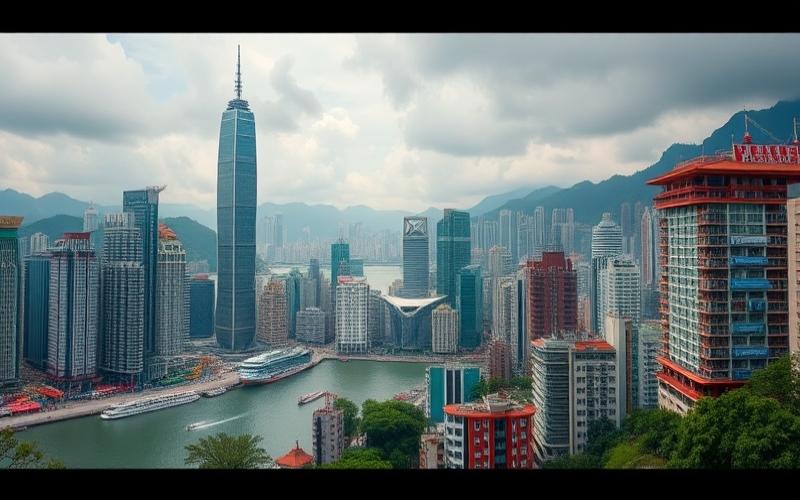
 Published on and written by Cyril Jarnias
Published on and written by Cyril Jarnias
Hong Kong Real Estate: Between Reality and Digital Illusions
In Hong Kong’s dynamic real estate landscape, where space is precious and choices are abundant, potential buyers must exercise heightened vigilance in the face of advancing digital technologies.
The retouched images used for property promotions often create a misleading reality, transforming modest apartments into seemingly spacious and bright gems.
Good to Know:
Retouching techniques frequently include digitally widening rooms, adding artificial lighting, and even altering perspectives to create an impression of space.
While digital tricks abound—from artificial lighting traps to enhanced panoramas—they pose a major challenge for those seeking their future home in this overcrowded metropolis.
Exploring the hidden dangers behind these embellished facades becomes essential for any savvy buyer eager to look beyond pixels and uncover the underlying truth of the properties on offer.
Deciphering Hong Kong Real Estate Listings
In Hong Kong real estate listings, the language used is often carefully chosen to present properties in their best light, sometimes even concealing less attractive aspects.
Table of Frequently Used Expressions and Their Actual Meanings
| Term Used | Possible Actual Meaning |
|---|---|
| Cozy | Very small apartment, sometimes cramped |
| Conveniently located | Close to transportation or shops… but also potentially noisy or overcrowded areas |
| Vibrant neighborhood | Lively area but often noisy and busy at all hours |
| Charming / Intimate | Limited space, atypical layouts, or impractical arrangement |
| Atypical / Unique layout | Inconvenient or difficult-to-furnish layout |
| Potential (great potential) | Significant renovations required |
List of Other Common Phrases and Their Hidden Implications
- Bright: Good lighting that might also mean absence of shutters/blinds.
- Original condition: No recent renovations; property may need complete refurbishment.
- Up-and-coming area: Neighborhood still developing, may currently lack essential services.
Importance of On-Site Inspections
Photos in listings are very frequently retouched: using wide-angle lenses to visually enlarge space, adjusting colors to hide wear or aging. Therefore, it is essential:
- To always visit the property to personally assess the actual layout, effective size, and general condition.
- To carefully observe the immediate environment (potential noise disturbances, neighborhood cleanliness).
Tools and Resources to Detect Photo Filters
- Use Google Street View to precisely locate the property in its real environment.
- Check multiple platforms like GoHome.com.hk or 591.com.hk to compare different photo sets of the same apartment.
- Scrutinize background details in images (window views, wall/ceiling conditions) that sometimes escape automatic retouching.
Quick Checklist of Recommended Actions Before Any Decision
- Compare official floor plans with photos
- Request a “raw” video taken during a visit
- Hire an independent agent for a counter-inspection
⚠️ Never rely solely on published images or flattering descriptions: only a physical visit allows reliable judgment of the desired Hong Kong property.
Good to Know:
To decipher Hong Kong real estate listings, it’s essential to understand the often embellishing language of real estate agents, where terms like “cozy” can mask small apartment sizes and “conveniently located” might hide noisy or unpleasant locations. Despite attractive but potentially retouched photos, an on-site visit is crucial to verify the actual layout and property conditions. Online tools allow comparing images with other sources or unofficial photos, offering a more realistic view of properties. Utilizing local review platforms or specialized forums can also provide valuable information and shared experiences from other buyers to avoid unpleasant surprises.
Common Pitfalls of Retouched Real Estate Photos
Common Retouching Practices in Hong Kong Real Estate
- Smoothing imperfections: digital removal of stains, mold, cracks, or unsightly cables on walls.
- Adjusting brightness and colors: artificial enhancement of natural light, increased saturation to make spaces appear warmer and more inviting.
- Visually widening spaces: using wide-angle lenses and digital straightening to visually enlarge narrow rooms.
- Removing/replacing elements: erasing or modernizing furniture through “virtual staging,” replacing gray skies with bright blue ones.
| Technique Used | Desired Effect | Concrete Example |
| Color correction/saturation | Warmer ambiance | Warm tones in living room |
| Wide angle/straightening | Sense of space | Bedroom appearing much more spacious |
| Defect removal/retouching | Hide aging or poor workmanship | Crack erased from wall |
| Virtual staging | Modernize/make property attractive | Contemporary furniture added digitally |
| Sky modification | Enhance facade/exteriors | Facade under artificial sunlight |
Specific Examples of Deceptive Manipulation
- Masking obstructed views: strategic cropping or digital addition of urban landscape when the actual view is blocked by another building.
- Removing urban noise: photos taken with closed double-glazed windows (not visible), giving impression of quiet environment when property is located right next to busy road.
- Erasing signs of aging: digital removal of moisture stains, peeling paint, or cracked tiles that would be obvious during physical visit.
Consequences on Purchase Decisions
– Creation of unrealistic expectations, potentially leading to major disappointment during actual visit and financial loss (unnecessary expenses incurred).
– Increased risk that buyer makes decision too quickly without sufficiently careful inspection or requesting additional evidence (detailed plans, diagnostics).
– Bias in comparing properties presented only through their best photographic angles to the detriment of essential real criteria like overall condition or noise environment.
Regulations and Ethical Codes in Hong Kong
Hong Kong authorities require real estate agents:
- A professional code prohibiting any misleading representation (misrepresentation) regarding essential property characteristics.
- Legal obligation for all licensed agents (Estate Agents Authority) to provide accurate information particularly on:
- Exact area,
- Actual condition,
- Any known structural defects.
If a buyer believes they were deceived by an advertisement containing obviously retouched images to the point of substantial deception:
- They can file a complaint with the Estate Agents Authority (EAA).
- Disciplinary sanctions can be taken against the offending agency (fine, suspension or even temporary/permanent license revocation).
- In case of proven harm: Legal recourse remains possible through Hong Kong courts to obtain compensation (damages).
Good to Know:
In Hong Kong, photo retouching in real estate is common practice, often involving smoothing imperfections, manipulating brightness, or artificially widening spaces to make properties more attractive. These practices can deceive potential buyers by concealing defects like obstructed views, urban noise, or poor building conditions. For example, a view of a wall might be replaced with a clear sky through digital editing. The consequences of these manipulations include regrettable purchase decisions based on false perceptions. To counter these abuses, Hong Kong has established ethical codes and regulations limiting excessive use of retouched photos, and recourse is available for deceived buyers, such as complaints to consumer protection agencies.
How to Avoid Real Estate Scams in Hong Kong
Common Practices in Hong Kong Real Estate Scams
- Document falsification: using fake sales contracts, false ownership certificates or payment receipts, and identity theft from documents obtained from rental or purchase applicants.
- Price manipulation: displaying abnormally low prices to attract victims, then sudden increases or requests for “exceptional” payments to reserve the property.
- Fraudulent listings: publishing ads for non-existent or already rented/sold properties, and demanding advance payments or deposits before any viewing.
- Fake real estate agents: people posing as agents or owners, often without license or certification.
- Photo retouching and manipulation: using enhanced images or those from other listings to make property more attractive than reality.
Specific Examples of Past Scams
– Cases of document falsification where a victim, after sending pay stubs and ID card for rental, had their identity stolen to divert salary to another account.
– Proliferation of fake listings, particularly during the pandemic, where “owners” demanded deposits before any viewing and then disappeared.
– Practices of fake agents who offer remote viewings or refuse all physical appointments under pretext of travel, illness, or emergency.
Tips for Verifying Real Estate Information Authenticity
- Consult only certified real estate agents and ask to see their official license.
- Always visit the property in person: never rely solely on photos or videos.
- Request independent evaluation of the property by an expert or recognized agency.
- Demand original ownership documents and verify their authenticity with Hong Kong’s Land Registry.
- Never transfer money before seeing the property and signing a legal contract in presence of a professional.
Recognizing Retouched or Misleading Photos
- Check consistency of proportions and perspectives: overly wide angles or excessively bright spaces may indicate retouching.
- Look for blurry details, distorted objects, or inconsistent reflections in mirrors or windows.
- Use reverse image search tools to verify if photo comes from another listing or foreign website.
Legal Measures and Recourse for Victims in Hong Kong
| Situation | Available Recourse |
|---|---|
| Document falsification | File complaint with police (ICAC) |
| Identity theft | Report to data protection service |
| Financial fraud | Contact Hong Kong Monetary Authority (HKMA) |
| Real estate contract dispute | Civil procedure with Small Claims Tribunal |
– Victims can also contact the Estate Agents Authority to report fraudulent or uncertified agents.
– It’s possible to claim restitution of unduly paid amounts through legal channels, and even obtain damages in case of proven harm.
Essential Points of Vigilance During Hong Kong Real Estate Transactions
- Always prioritize transparency and traceability in exchanges.
- Be wary of offers that seem too good to be true or require urgent action.
- Keep copies of all communications and exchanged documents.
- Take time to compare multiple listings and consult independent reviews.
Vigilance and systematic verification of information remain the best defenses against real estate scams in Hong Kong.
Good to Know:
To avoid real estate scams in Hong Kong, it’s crucial to be wary of common practices like document falsification and price manipulation. Always verify information authenticity by consulting certified real estate agents, visiting properties in person, and requesting independent evaluations. A famous example is the fraudulent sale of properties with fake titles, highlighting the importance of meticulous verification of official documents with competent authorities. Legally, you can report these abuses to Hong Kong’s Estate Agents Authority which provides recourse for victims. Additionally, be vigilant about retouched photos, often used to embellish properties; compare images with other listings and watch for fantastic underpriced offers. Vigilance and double-checking are essential for navigating Hong Kong’s complex real estate market.
The Importance of Realistic Virtual Tours
Realistic virtual tours are transforming Hong Kong real estate purchasing decisions by strengthening client confidence and dispelling skepticism associated with retouched photos.
Traditional real estate photos, often retouched or taken from flattering angles, can hide certain defects or exaggerate a property’s qualities. This practice regularly generates distrust and disappointment during physical visits, as buyers sometimes discover spaces very different from those presented online.
Main Advantages of Realistic Virtual Tours:
- Increased transparency: Virtual tours allow potential buyers to freely explore each room in 360 degrees, observe views from windows or balconies, and even move around as if physically present in the home.
- Faithful space perception: Actual layout, room volumes, and flow between spaces are accurately represented.
- Environmental context discovery: Through HD video integrations and drone views, it’s possible to appreciate the immediate environment (neighborhood, street) – a crucial aspect in a dense city like Hong Kong.
- Facilitated buyer projection: Advanced tools even allow personalized virtual home staging according to client preferences.
Concrete Example:
| Company | Virtual Tour Usage | Client Feedback |
|---|---|---|
| Midland Realty | Immersive 3D presentation | “I could explore several apartments without traveling; I saved time and avoided any bad surprises.” |
| Centaline Property | Interactive VR tours | “The transparency reassured me in Hong Kong’s competitive market where every detail matters.” |
Observed Client Feedback:
- Fewer post-physical visit disappointments
- Faster decisions due to better property understanding
- Increased sense of transparency
Technical and Logistical Challenges Specific to Hong Kong:
- Limited spaces: Apartments often being small with complex configurations (narrow corridors, multiple levels), specialized cameras capable of precisely capturing these atypical volumes are necessary.
- Regulatory constraints: Some condominiums temporarily limit or prohibit access for full building scanning due to administrative or security reasons.
- High bandwidth requirements: To offer smooth high-resolution experience on both mobile and computer despite sometimes saturated local networks.
Recapitulative List of Key Points:
- Reduced risk from misleading images
- Faithful appreciation of both home and surrounding neighborhood
- Accelerated decision-making process for buyers
- Logistical challenges related to Hong Kong’s dense urban topography
In summary: The widespread adoption of realistic virtual tours now represents an essential vector for restoring trust and transparency in Hong Kong residential real estate. Despite some technical challenges specific to the very dense local urban context, their adoption by major agencies—coupled with positive feedback from their clients—already demonstrates concrete impact on perceived quality and actual commercial conversion rates.
Good to Know:
Realistic virtual tours play a crucial role in Hong Kong real estate by mitigating skepticism generated by retouched photos. They allow potential buyers to see a property from all angles, facilitating evaluation of space and location without the filter of digital enhancement. Companies like Ricacorp Properties and Midland Realty have adopted this technology, reporting significant increases in informed purchase decisions. According to client feedback, the immersion provided by these virtual tours simplifies visualization of layouts and surrounding perspectives, thereby increasing their confidence level. However, deploying these technologies in Hong Kong presents technical challenges, particularly due to urban density that can complicate needs for specialized equipment and management of large data volumes.
Disclaimer: The information provided on this website is for informational purposes only and does not constitute financial, legal, or professional advice. We encourage you to consult qualified experts before making any investment, real estate, or expatriation decisions. Although we strive to maintain up-to-date and accurate information, we do not guarantee the completeness, accuracy, or timeliness of the proposed content. As investment and expatriation involve risks, we disclaim any liability for potential losses or damages arising from the use of this site. Your use of this site confirms your acceptance of these terms and your understanding of the associated risks.












































